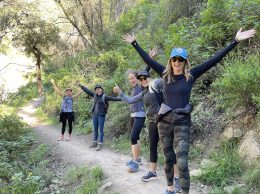Central Coast banks on startups to drive growth
IN THIS ARTICLE
- Central Coast Topic
- Stephen Nellis Author
By Stephen Nellis Friday, May 23rd, 2014
Summer is already heating up for entrepreneurs in the region with two accelerator programs hosting startups.
Cal Poly San Luis Obispo’s successful SLO Hot House program is welcoming its fourth cohort of companies, with every college of the university represented among this year’s participating teams. And after years of planning between officials at UC Santa Barbara, the city of Goleta and business leaders, the Goleta Entrepreneurial Magnet will open its doors to student and community startups in the coming weeks.
Here’s a closer look at each accelerator.
SLO Hot House
Cal Poly has a fresh crop of teams for its SLO Hot House, a co-working space in downtown San Luis Obispo funded by the university and the business community that hosts a summer accelerator program for student startups. The venture has successfully incubated companies that have since been acquired, such as Grappple, an app for sharing “bucket list” goals.
This year, 37 student teams applied for a spot in the accelerator program, which includes expert mentoring and professional services. Eight teams were selected, and every college within the university is represented, with liberal arts majors alongside traditional majors such as engineering and business.
“The students are really responsible for that,” said Jon York, an entrepreneurship professor at Cal Poly who heads several of the campus-wide startup efforts. “You find great students everywhere, and they realize they can do it too. And the faculty encourage them. That’s been our goal from the start, to cut across all disciplines and any silos that might exist in the university.”
The accelerator is currently looking for a new space because its location is part of a redevelopment project. York said it is hoping to remain in the downtown core of San Luis Obispo because it’s the heart of the city’s business community. “Once they go full time into their business, we think it’s really important for them to be off campus in the real world. We also get a lot of walk-ins. We had one person walk in the other day, and it turns out he’s been involved in a lot of startups and has a lot of talent,” York said.
This year’s Hot House teams covered a wide range of business ideas.
• BeatStream is a music sharing and discovery service that hopes to use Twitter-style dynamic hashtags to show what’s trending. The project won San Luis Obispo’s most recent StartupWeekend. “You can listen to a single stream of music that your friends love,” said team member Matt Bleifer.
• Boost Acquisition hopes to help car dealers find better used vehicles. Most wholesalers and dealers manually sift through online classifieds, but the team hopes to aggregate those listings and use an algorithm to select only the deals that will let dealers make money. The team came up with the idea while flipping cars for cash over the summer.
• home2o (pronounced “home two oh”) is designing a sleek box that so-called “smart” appliances and home systems — such as automated lighting — can be plugged into for automatic configuration. The idea is to make the wired home “just work,” the team said.
• LockNLoad makes a removable lift capable of hauling 1,000 pounds onto the bed of a pickup truck. Team leader Justin Russo said the target market is construction companies and that sales will start this fall. “We’re going to build them here locally,” he said. “We’re bringing back American manufacturing.”
• Moja Gear is a community-driven rock climbing market place that sells in a retail shop and has an Etsy-like market for small gear makers. “It’s not just the sport that excites them — it’s the community,” said team member Sander DiAngelis.
• Swings for Dreams is a nonprofit founded by landscape architecture and design students to build playgrounds in the developing world. [See Business Times story on page 4A of the May 9 issue.]
• TandemMech Engineering makes wall-climbing robots that can carry heavy loads for inspecting things like storage tanks and windmills. “We’re introducing the world to carrying advanced inspection equipment to places where robots have never gone before,” said team member Cameron Venancio.
• WineSav is planning to sell wine-tasting kits complete with an app that links directly to wine that can be bought online. The ideas is to help consumers buy with more confidence. “The status quo is for people to accept what’s told to them. We change that,” said team member Michael Kraft.
GEM
The Goleta Entrepreneurial Magnet, or GEM, has been in the works for several years, with support from UCSB, the city of Goleta and the Goleta Valley Chamber of Commerce, among others.
The group’s goal was to retain Goleta-based entrepreneurs to start businesses in the city. It will host its inaugural summer accelerator class of six teams. The teams will get seed investments of up to $8,000, participate in weekly workshops with business experts, and will get to pitch investors during demo days.
GEM is hoping to host several winners from UCSB’s well-established New Venture Competition, as well as housing startups that are already hard at work, such as NextMover, a fast-growing company that describes itself as Lyft for moving services, and AstraFluidics, a previous winner from the New Venture Competition. The accelerator hopes to draw from business-plan competitions at Santa Barbara City College and Westmont College as well.
GEM found a space above ATK, the aerospace and defense company a few blocks off Hollister in Old Town Goleta, an area that city leaders are hoping to revitalize with new businesses. “It’ll be a nice safe place to work at all hours of the day or night,” said Executive Director Doug Lynch.
Lynch said the group studied what worked about the Hot House program in San Luis Obispo and is hoping to emulate its success on the South Coast. The program will be “like an incubator on speed — two months of mentorship, lectures and workshops to get out there and elevate your business,” Lynch said.
GEM is organized as nonprofit. A number of firms, from law firms to Internet service providers to printer companies, offered in-kind donations. The goal is to foster a vibrant economy in Goleta, Lynch said. Many young people are realizing that entrepreneurialism is a now basically a required skill, whether you want to start a company or get a job with the best and fastest-growing firms.
“A lot of them are realizing that 20 years ago, a four-year degree got you a good job. Now a four-year degree gets you an entry-level job,” Lynch said. “And even if they don’t go off and start their own companies, what we’re finding is that just learning these skills hold them in good stead in an existing job.”
Related Articles
 Friday, September 30th, 2022
Friday, September 30th, 2022










